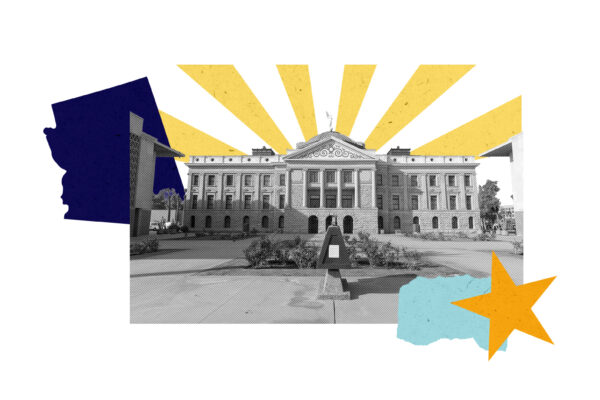The Arizona legislature adjourned Sine Die on Saturday, June 15, 2024. With a slight majority in the House and Senate, regressive politicians advanced legislation that attacks the civil rights and liberties of Arizonans. Nevertheless, we successfully fended off many of the worst bills and championed some historic wins.
We owe it to our supporters, partners, and community members for advocating alongside us for 160 days. Together, we successfully made our state a better place to live for all Arizonans.
Impact by the Numbers
1,663 bills and resolutions were introduced this session. The ACLU of Arizona tracked 382 bills that impact civil rights and liberties. Here’s what we accomplished with your support.
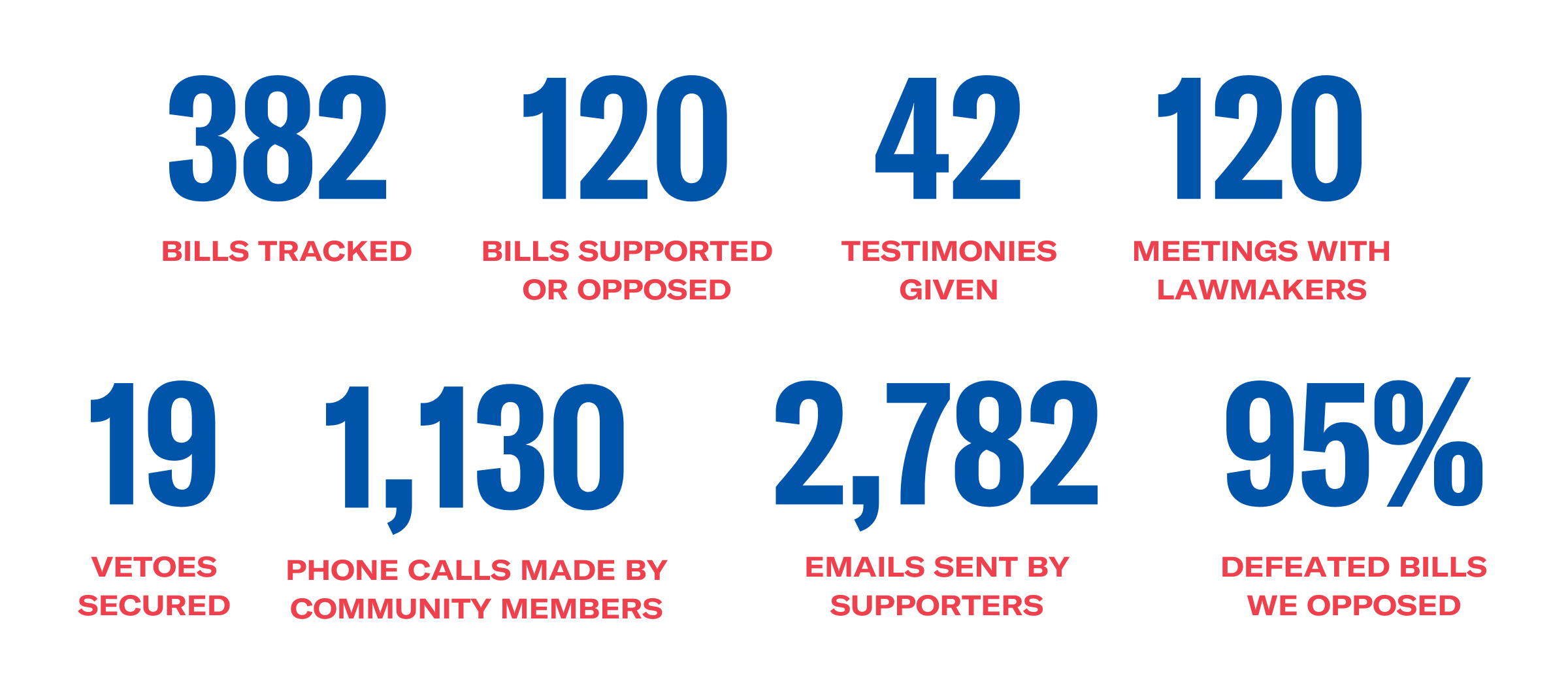
- Publicly supported or opposed 120 bills
- Testified on 42 bills in committee hearings
- Held 120 advocacy meetings with lawmakers
- Lobbied for, and secured, 19 vetoes
- Worked with community members to make 1,130 phone calls and send 2,782 messages to lawmakers, and
- Defeated over 95 percent of the bills we opposed
The ACLU of Arizona, our partners, and community members fought hard to defend liberty, democracy, equity, and justice — and more often than not, we succeeded.
Keep reading to get a full picture of our work at the Capitol, or skip ahead to specific issues by using the links below.
Liberty
Arizona continues to be a hotbed for extreme anti-LGBTQ+ legislation, but Governor Hobbs used her veto power to fend off attacks that made it to her desk. That wasn’t the only challenge against essential liberties — following a state supreme court decision to allow enforcement of the 1864 ban, our community came head-to-head with lawmakers to fight for abortion access.
For a second year, we introduced HB 2625, our coalition-backed nondiscrimination bill. While we knew our chances of success were slim against a homophobic and transphobic legislative majority, we know our queer friends, family, and community members deserve better.
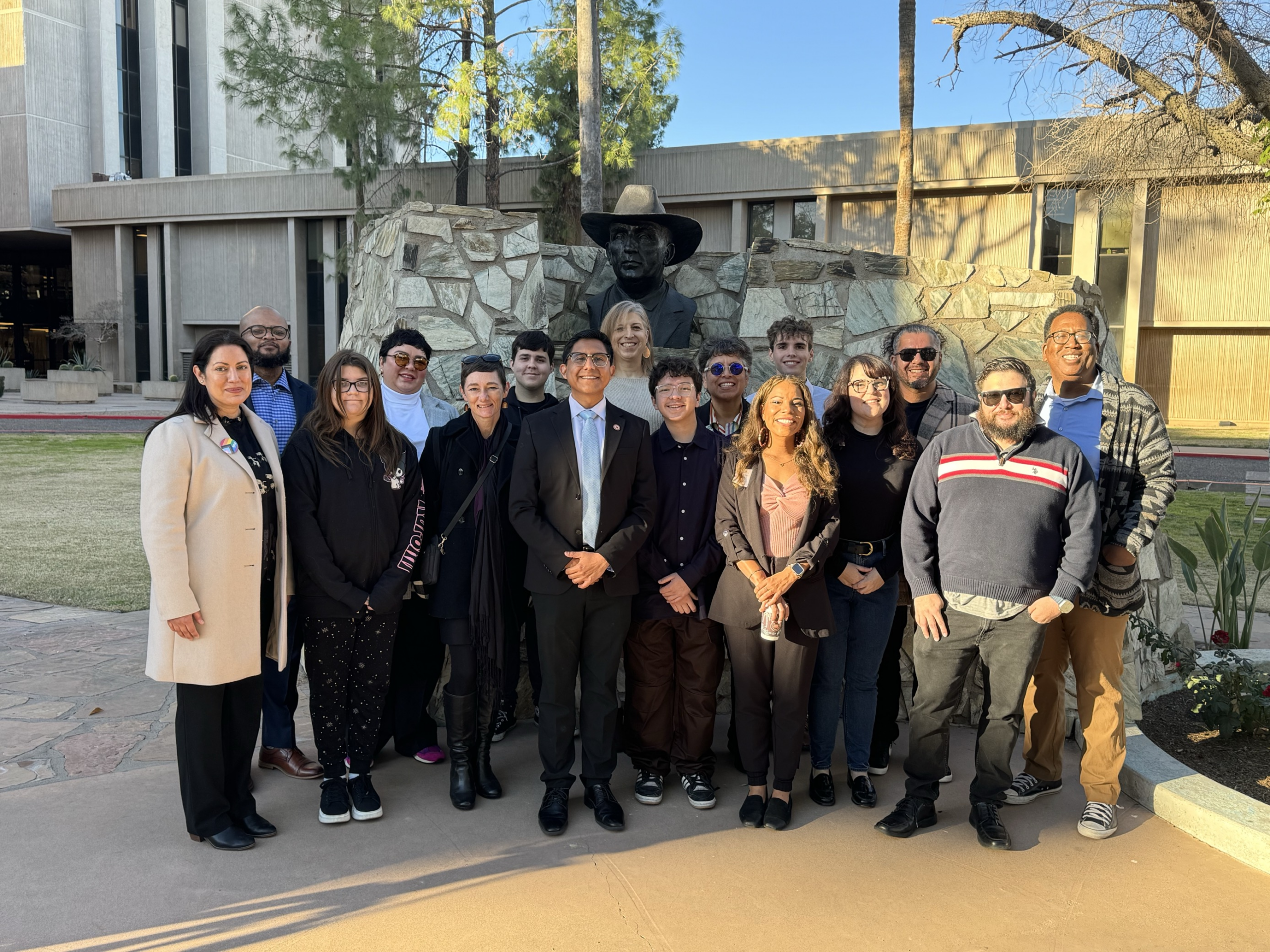
"I think states and policymakers need to make clear, and we as a society need to make clear, our continuing support for and belief in nondiscrimination. That people’s characteristics — their race, their gender, their sexual orientation, their gender identity — should not be the basis for whether or not they’re employed or receive services," Darrell Hill, policy director for the ACLU of Arizona, said to Juliette Rihl for Lookout PHX.
Good News
- Lawmakers reluctantly repealed the 1864 near-total abortion ban, but only after our state nearly lost full access to abortion care. The community turned out for weeks until the legislature finally did the right thing and passed HB 2677.
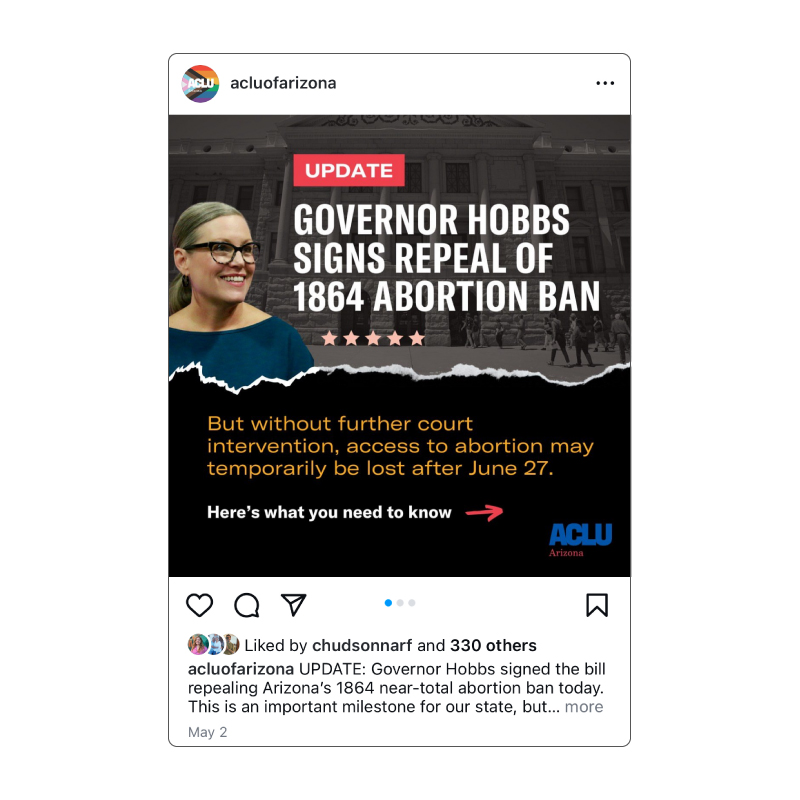
- Advocates successfully defeated SCR 1013, which would have created a discriminatory ban on shower and bathroom use as well as a pronoun ban for LGBTQ+ students. Public testimony from community members and trans youth were effective in swaying lawmakers to vote no.
- Governor Hobbs vetoed SB 1007, which was in violation of the First Amendment and would have prohibited schools from sharing sexually explicit materials, including sex education materials and books.
Equity
Legislation based on cruel, anti-immigrant narratives took center stage this legislative session. The ACLU of Arizona was one of the first organizations to testify against five harmful bills that sought to punish migrants and people who provide humanitarian assistance. As the session drew on, partners and community members activated to secure important wins.
The first set of bills were vetoed by Governor Hobbs, and our policy team worked tirelessly to provide analysis and strategy to lawmakers when the bills came back as a ballot referral.
Good News
- Governor Hobbs vetoed SB 1608, which would have added new criminal penalties related to human smuggling that could be weaponized against nonprofits and community groups that provide basic, humanitarian aid to migrants at the border.
- Governor Hobbs vetoed SB 1231, which would have made it a state crime for anyone without lawful immigration status to enter Arizona from a foreign country through anywhere other than a port of entry.
- Governor Hobbs vetoed HB 2658, which would have violated the First Amendment by making it a crime for people to solicit donations in public areas — a clear attempt to criminalize homelessness.
- HB 2506 failed to pass. The discriminatory bill would have required any person whose employer was based in certain foreign countries or owned by someone of specific nationalities to register as a foreign agent.
Bad News
- The legislature sent HCR 2060 (now Prop. 314) to the ballot, an extreme, unconstitutional, and anti-immigrant ballot referral that would apply new state penalties to violations of federal immigration law.
Press Release: ACLU of Arizona Reacts to Senate Vote on HCR 2060
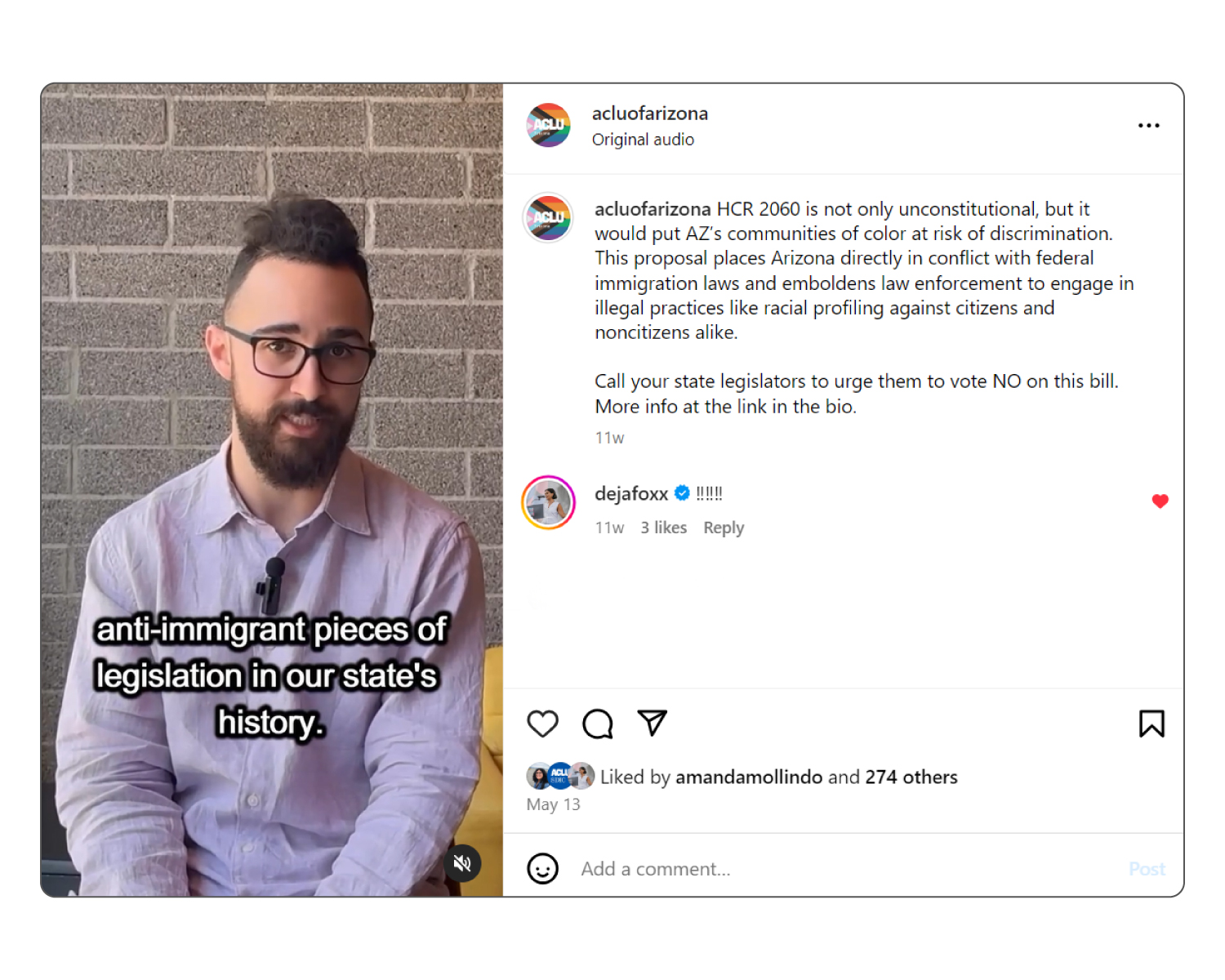
Justice
The ACLU of Arizona fought and defeated several bills that would have fueled mass incarceration, continued the failed war on drugs, and increased racial disparity in the criminal legal system.
Good News
- Governor Hobbs vetoed SB 1414. We opposed this bill because it would create exorbitant penalties, such as a 10-year prison sentence, for repeat nonviolent shopping lifting offenses.
- SB 1367 passed, allowing more people with a criminal history to obtain licenses, permits, certificates, or other state recognition by limiting an agency’s ability to unfairly use their record against the applicant.
- HB 2104 failed to pass, which would have dismissed complaints against police officers, simply because the agencies themselves have failed to properly investigate those complaints promptly. This would have included officers under the Maricopa County Sheriff’s Office, which is currently under court orders and the Phoenix Police Department, which is facing a federal investigation.
Bad News
- The legislature passed a budget that diverted funds from the national opioid settlement to prisons. In the face of a mounting opioid crisis, millions of dollars meant for substance use treatment and public health services were instead committed to the Arizona Department of Corrections, Rehabilitation, and Reentry, which has a long history of mismanagement and abuse. It is critical funds from the opioid settlement are used to reduce overdose deaths in our communities and we will continue to lobby to ensure these funds are used in the manner intended.
- Governor Hobbs signed HB 2045, which added Xylazine to the definition of 'dangerous drugs’ in the criminal code — further criminalizing substance use, rather than passing policies that center treatment and support.
Democracy
Attacks on the elections process have become commonplace at the legislature, but new concerns arose when election administrators warned about the possibility of Arizona missing the newly revised Electoral College Reform Act deadline for submitting its certificate of electors. We collaborated with advocates in the Voting Rights Coalition to ensure that no compromises to amend the deadline would harm voters. Our efforts were largely successful — the emergency fix passed and took effect in time to meet federal election deadlines this year.
Along with voting rights, the ACLU of Arizona again found itself at the forefront of the policy fight over free speech, including the right to protest, the right to an internet free of government censorship, and the right to access and provide minors health materials about safe sex and reproductive health. We partnered with organizations like CAIR Arizona and Arizona Palestinian Solidarity Alliance to ensure community members could testify against bills that threaten First Amendment rights on college campuses, and we weighed in on sweeping “deep fake” bills that would carry penalties for protected speech.
Good News
- Governor Hobbs Vetoed SB 1336, which would have criminalized speech protected by the First Amendment by allowing felony charges for creating “deep fake” videos or images that depict intimate body parts or sexual acts without the consent of the depicted individual.
“Hill added that the ACLU understands the fears around the use of AI and deep fakes and the potential for abuse, but believes that regulations should be crafted more narrowly to include traditional exceptions for satire and political speech, and to target deep fakes that are made with the intent to harass or defraud someone,” Caitlin Sievers wrote in the Arizona Mirror.
- Governor Hobbs vetoed HB 2586, which would have violated the Constitution by requiring certain websites to verify the age and identity of all people who view certain materials. The Supreme Court has continually held that the government may not restrict access to materials on the internet.
Read our letter urging Governor Hobbs to veto HB 2586
- HB 2759 failed to pass. This bill would have required Arizona’s public universities to violate the academic freedom and free speech of student organizations that make statements that, while some may find offensive, are protected by the First Amendment.
- SB1651 failed to pass. It would have required unlawful, costly, inaccurate, and time-consuming hand counts for all elections. Arizona’s current method is faster, more accurate, and includes quality-control checks to ensure an accurate count.
- SB1653 failed to pass. The bill would have jeopardized voter privacy and the administration of elections by requiring election officials to provide images of all ballots cast prior to results being finalized.
Bad News
- SCR 1044 was referred to the November ballot. This proposal would eliminate the judicial retention system, essentially permitting lifetime appointments and taking away voters’ power to hold accountable state Supreme Court Justices for fraud or abuse.
- Governor Hobbs signed HB 2310. We opposed this bill because it creates harsh criminal penalties for protected speech when it is shared with a minor, including age-appropriate communications about sexual and reproductive health. Once in effect, this law will threaten educators, book sellers, librarians, parents, and even minors themselves.
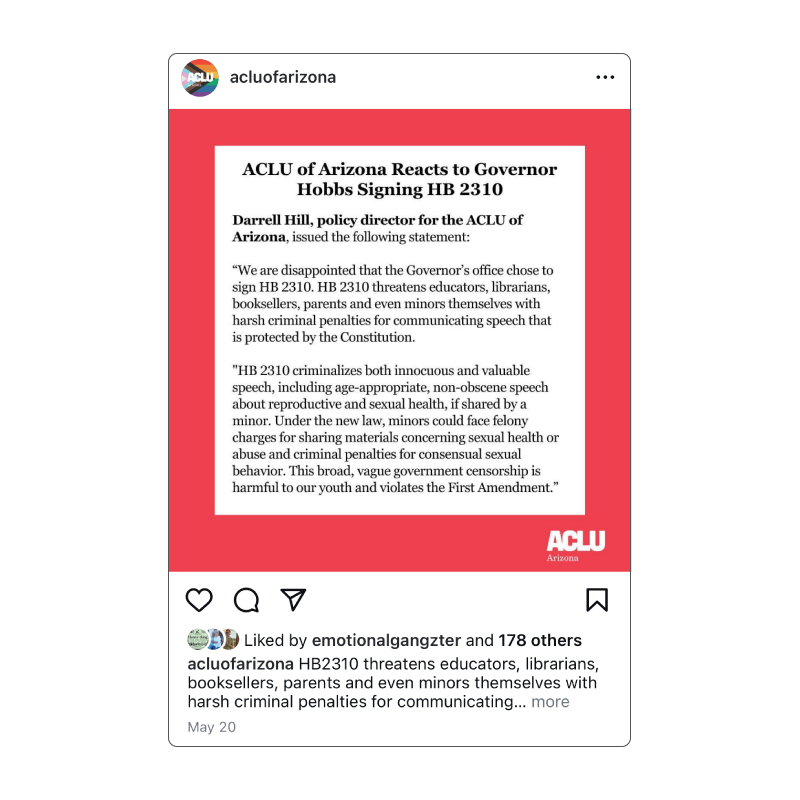
- Governor Hobbs signed HB 1359. Another “deep fake” policy, this law prohibits anyone from creating a synthetic media message of a candidate on the ballot that is considered deceptive.
"We think speech about our politics and about our politicians deserves the utmost protection. So it's very important we don't overreach or chill speech − chill a rambunctious discussion of matters of public concern,” said policy director Darrell Hill to The Arizona Republic in May.
Looking back and forging ahead
The legislative session is always one of the busiest times for the ACLU of Arizona, and also one of the most important. We have come a long way to tip the scales towards liberty, equity, justice, and democracy in the last few years.
This year was not without setbacks, but every challenge is an opportunity to work more closely with partners, mobilize more community members, and sharpen our skills as a team to impact policy that will help Arizonans thrive. As always, thank you for your support this session. We hope we can count on you again next year as we continue to defend and advance civil rights and liberties at the Arizona state legislature.

